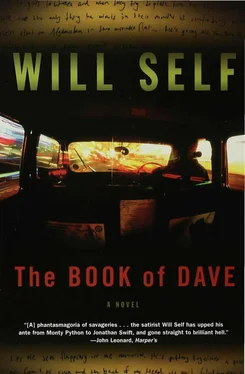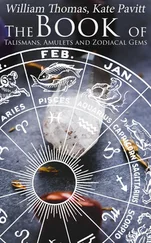No one in London had known precisely where the Geezer had hailed from — the name Ham was whispered, yet this meant nothing, for there were thousands of Hams scattered over the archipelago of Ing. In the time before the dävidic line was established in the city that came to be called London, many of these places were claimants to be the true cradle of the faith. Antonë had never conceived of the Geezer's Book as having a material reality, any more than he had imagined it being found in the same place as the first. Now two kinds of Knowledge joined together in Antonë Böm's mind, two worlds irrupted into each other. If … if the Geezer spoke the truth … Böm could barely formulate the thoughts … Then then, this … this is Ham- Hampstead … and that … beyond the reef… below the lagoon … is … is London. For did not Dave speak of a mighty flood, a great wave transforming the city's streets into raging rivers?
Böm held the Knowledge of Ham as completely as any native granddad or grannie; it was his Knowledge of the Book that had faded. Its runs and points had been sing-songed into mere sounds by the lads in the Shelter. For tariff after tariff, then blob after blob, and finally year after year. While Böm leaned his weary head on the doorjamb and gazed out to sea, to where the stacks were spray-dashed in the swell, what was it that the lads had chanted? Rì Wyldwúd Röd. Leff Norfend Wä. Compli Spanyads Layn, Forrud Eef Street … The area of dense woodland along the north shore was known as the Wyldwúd. The lane that ran down from the moto wallows between Wess Wúd and Sandi Wúd was called Norf to differentiate it from the Layn that ran along the spine of the island. That these old tracks, worn by the feet of Hamsters and motos, conformed to the runs, conformed to the Knowledge — could it mean anything?
Which had come first: the Knowledge or Ham? Surely it was more likely that the ancient Hamsters had named their rustic tramps after the majestic thoroughfares described in the Book? Yet… and yet… Forward Heath Street… then into the Zön, then left Beech Row … and was that where the Book had been disinterred some five hundred years before? If there was an answer to the conundrum it lay in the shrub-choked Ferbiddun Zön. It lay here on Ham.
Antonë Böm did not sleep that night. When the first tariff came and the foglamp was switched on in the east, he was down at the shore pacing back and forth. A rank of motos nosing down from the Layn sighted him. Knowing better than to approach the teacher, they hung back, shrouded by the mist, their slushy calls muffled by the damp air. Alwyt, Tonë, alwyt, they cooed, hoping he had overcome his old revulsion enough to come and pet them. Instead Böm walked on along the shore, past the dim box of the Driver's semi, which seemed to suck solidity out of the nebulous atmosphere, then on around the bay to the manor. All was silent and still, the occasional cooee chew-chew-chew of a gull banking over the beach as mournful as the wail of an abandoned child.
Antonë Böm stood by a stand of blisterweed and regarded the Hamsters' humped and mossy gaffs. It wouldn't be long before the first mummies and opares were up, stoking the fires with fresh wood, heating up cracked wheatie and moto gubbins for the dads and kids. The Hamsterwomen's labours began early and were never done. The boilers and mummies told Böm that before the Driver came there had been little or no violence on Ham. Now he understood — it was the Geezer's fault, the daddies were punishing the mummies for what had happened during the time of the Geezer, and the Driver was inciting them.
Ware2, guv! It was Caff Ridmun who called to him, jerking the teacher away from his thoughts. She'd come out from the Bulluk gaff and was heading over to the spring to fetch evian. 2 Nú Lundun! Böm called back — and in that unit his mind was made up. He would penetrate the Ferbiddun Zön and discover its secrets — whatever the consequences might be.
The screenwash came late that autumn — not until NOV was almost over. The climate on Ham was always temperate, but this year it seemed as if kipper would never arrive. The motos were still sleeping out in the woodland, while fat flies doodled in and out of the shack where the Hamsters made waste of their natural products. The community became uneasy. The oldest of the grannies and granddads told tales of former times, when during such spells freakish waves had reared up out of the Great Lagoon, drenching the home field with curry and destroying the soil's fertility for a generation. On one occasion Ham had been almost completely depopulated. When the Hack arrived from Chil, he found only a few mummies and kids huddled in the empty byres — almost all the Hamstermen had died, some from starvation, others during a desperate fowling trip out to the stacks. The motos too were severely reduced in numbers. Daddies had to be brought forcibly from Chil to settle on the island. It was said that it was then that the decline began, and the Hamsters shrank until they were naught save pygmies compared to their mighty forefathers.
Against a backdrop of flaming autumnal leaves, the Driver called over the Book — while Antonë Böm scurried away from the Shelter as fast as his chubby legs would carry him. Yaw blankin me! Carl Dévúsh called after him. Yaw blankin me, Tonë! The lad ran, his bare feet sure on the slippery turf, and caught up with his mentor. Oi! Wossup? Ware U goin? Carl's hand was on Antonë's arm, and in its pressure the older man could feel all the weight of the responsibility he sought to avoid, the daddystuff, the daddytime, the need to work and build, to make a better world. He shrugged the hand off, turned from the expectant eyes, walked on hurriedly up to the Layn and went on down into the woodland. Carl was not to be so easily discarded. He followed behind, crying out: Wot ve mummies bin tellin yer, Tonë? Eh, wot vey bin tellin yer? Vey töl U abaht me dad, iz vat í, iz vat í?
Böm blundered in and out of boggy sloughs with no care for the state of his jeans. As the lad pursued him, he became increasingly hysterical — the whirl of speculation about Ham and the agitation in his feelings it provoked sucked him into a vortex of abandonment. Why? he implored aloud. Why O Dave have you dropped me off? He had never wanted it this way: to be queer was bad enough, to be exiled as a flyer worse, now these chellish mummies conspired to place him for ever outside the Shelter. Whippystalks tore at his beard and hair, the wind rose and the yellow leaves flashed against the deep, blue sky — the whole spherical space of Ham was in motion, a flickering between faith and faithlessness. Sweetë, startled by Böm's thrashing through the underbrush, started up from where she'd been lying and trundled off into a thicket. The sight of the moto's vast and brindled flanks set Böm on another course: The motos … grotesque mutants … slobbering, giant babies … are we not all babies, mired in our own ordure, babbling nonsense? Böm sank down in a boggy patch, and his hands drove into the brackish morass. He moaned and brought clutches of the muddy weed up to his face, squeezing the sludge between his fingers. You fucking bitches! he blubbered. You fucking bitches … You've taken — you've taken ev-ery-thing!
Carl stood a little way off, his slight figure camouflaged by his bubbery cloakyfing. He looked at Böm with a curious expression, concerned yet almost contemptuous. A fulcrum had been wedged beneath their association — and the balance was tipping in Carl's favour. Eventually he moved towards the teacher, bent down and stared into the muddy face.
— Vey töl djoo, diddun vey?
Böm nodded; there was a smear of blood at the corner of his mouth.
— U no wot cums nex … Carl took his shoulder, shook it. U no, Tonë, we gotta go an fynd out. We gotta go intah ve zön … U no … ware mì dad went… We gotta fyndaht ve troof.
Читать дальше












